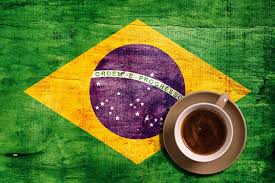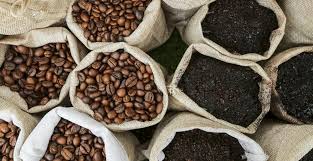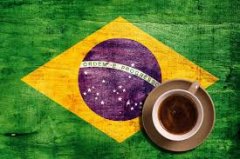Brazil is the world's largest coffee producer and exporter.

For most of us, an important aspect of the morning ceremony is drinking a cup of coffee. So I decided to look at this typical aspect of our daily life. About 1/3 of the world's coffee comes from Brazil, making the BRIC country the world's largest coffee producer and exporter. Brazil has been in this position for the past 150 years. The coffee plantation covers an area of about 10000 square miles and is mainly located in the southeastern states of Minas Gerais, Sao Paulo and Parana, where the environment and climate provide ideal growth conditions.
The crop first arrived in Brazil in the 18th century and the country became a major producer in the 1840s. Coffee is not native to America and must be grown in that country. According to historian Boris Faust in his book the Concise History of Brazil, the first coffee bush in Brazil was planted by Francisco de Melo Palheta in Para in 1727. According to legend, the Portuguese want to profit from coffee. The market, but unable to obtain seeds from the French Guiana border because the governor was unwilling to export seeds. Parharta was sent to French Guiana on a diplomatic mission. On his way home, he managed to smuggle seeds to Brazil by seducing the governor's wife.
By the 1920s, Brazil monopolized the international coffee market and provided 80% of the world's coffee. Since the 1950s, the country's market share has declined steadily as a result of increased global production. Despite the decline in the share of the Brazilian government and its attempts to reduce the dependence of the export sector on a single crop, coffee still accounted for 60 per cent of Brazil's total exports in 1960, while Brazil still accounts for a considerable proportion of its exports today.
Brazil's processing industry is divided into two different groups, ground / roasted coffee and instant coffee. The competition in the ground / roasted coffee market is fierce. By contrast, the instant coffee market is highly concentrated, with the big four companies accounting for 75% of the market. Brazil is the world's largest exporter of instant coffee, accounting for 10-20% of total coffee exports. These two kinds of coffee are mainly exported to the United States.

Coffee remains an important export, although its importance has declined over the past 50 years. Between the 1850s and 1960s, coffee exports accounted for more than 50 per cent of total exports, peaking at 63.9 per cent in 1950. In the 1960s, when other export heavy industries expanded, this proportion began to decline. Coffee exports fell to 12.3% of the total in 1980 and only 2.5% in 2006.
There is no tax on Brazilian coffee exports, but imports of green and roasted coffee into the country are taxed at 10 per cent and soluble coffee at 16 per cent. Unprocessed coffee can be exported duty-free to the three largest markets: the United States, the European Union and Japan, but processed coffee such as roasted beans, instant coffee and non-caffeinated coffee is taxed at 7.5% in the European Union and Japan. Exports to the United States are duty-free.
Brazilian coffee exports increased sharply in 2013 due to a sharp drop in exports due to excessive rainfall in 2012, according to the Brazilian Coffee exporters Committee or Ce Cafe. According to an article published in the Wall Street Journal, Brazilian farmers exported 31.2 million bags of beans (132lbs) between 2006 and 2013, an increase of 10.2 per cent over 2012. In December, coffee exports fell 4.5 per cent from a year earlier to 2.8 million bags. "
Brazil is the world's largest coffee producer and exporter, and the size of its annual harvest could have a strong impact on world prices. Brazilian coffee exports earned US $5.15 billion in 2013, down from US $6.36 billion in 2012, when coffee prices were higher. CeCafe estimates that Brazil will export 32 million to 33 million bags of beans in 2014.

Where do you spend all this coffee? who? Brazil itself is the second largest consumer of coffee, followed by Germany, according to the London International Coffee Organization. A large portion of Brazil's coffee exports will come from the United States, the world's largest consumer of coffee. According to a 2013 survey by the National Coffee Association, about 83% of adults drink coffee in the United States, compared with 78% in the same period last year.
How long will the United States hold on to this title? Where does the price of coffee start? Starbucks recently proposed a strategy to integrate Starbucks stores into the Chinese market. It remains to be seen that coffee prices in the world's most populist country will slowly but certainly replace their tea consumption with coffee.
Important Notice :
前街咖啡 FrontStreet Coffee has moved to new addredd:
FrontStreet Coffee Address: 315,Donghua East Road,GuangZhou
Tel:020 38364473
- Prev

Brazil is the world's largest coffee producer and exporter.
For most of us, an important aspect of the morning ceremony is drinking a cup of coffee. So I decided to look at this typical aspect of our daily life. About 1/3 of the world's coffee comes from Brazil, making the BRIC country the world's largest coffee producer and exporter. Brazil has been in this position for the past 150 years. The area of the coffee plantation is about 10
- Next

More than 70 countries produce coffee, but the vast majority of the supply comes from Brazil, Vietnam and Colombia
Although many top coffee-producing countries are well known, some people may be surprised. The coffee tree is a tropical evergreen shrub that grows between the tropics and Capricorn. The climate and conditions must be suitable for growing the world's most popular beans.
Related
- Unexpected! Ruixing Telunsu lattes use a smoothie machine to foam milk?!
- % Arabia's first store in Henan opens into the village?! Netizen: Thought it was P's
- Does an authentic standard mocha coffee recipe use chocolate sauce or powder? Mocha Latte/Dirty Coffee/Salty Mocha Coffee Recipe Share!
- What is the difference between Vietnam egg coffee and Norway egg coffee? Hand-brewed single product coffee filter paper filter cloth filter flat solution!
- What is the difference between sun-cured and honey-treated coffee? What are the differences in the flavor characteristics of sun-honey coffee?
- How to make Italian latte! How much milk does a standard latte use/what should the ratio of coffee to milk be?
- How to make butter American/butter latte/butter Dirty coffee? Is hand-brewed coffee good with butter?
- Is Dirty the cold version of Australian White? What is the difference between dirty coffee/decent coffee and Australian white espresso?
- Relationship between brewing time and coffee extraction parameters How to make the brewing time fall to 2 minutes?
- Got entangled?! Lucky opens a new store, Mixue Ice City, and pursues it as a neighbor!

